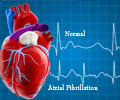Artificial intelligence-based methods can work with the tests and clinical approaches used every day to improve risk prediction and take care of patients with atrial fibrillation.

‘The artificial intelligence-based method can prompt clinicians to modify important risk factors for atrial fibrillation that may reduce the risk of developing the disease altogether.’





Therefore, people who are identified with risk for developing atrial fibrillation could benefit from preventative measures. The research findings are published in the journal, Circulation.Researchers developed the artificial intelligence-based method to predict the risk of atrial fibrillation within the next five years based on results from electrocardiograms (non-invasive tests that record the electrical signals of the heart) in 45,770 patients receiving primary care at MGH.
Next, they applied their method to three large data sets from studies including a total of 83,162 individuals.
The AI-based method predicted atrial fibrillation risk on its own and was synergistic when combined with known clinical risk factors for predicting atrial fibrillation. The method was also highly predictive in subsets of individuals such as those with prior heart failure or stroke.
“We see a role for electrocardiogram-based artificial intelligence algorithms to assist with the identification of individuals at greatest risk for atrial fibrillation,” says senior author Steven A. Lubitz, MD, MPH, a cardiac electrophysiologist at MGH and associate member at the Broad Institute.
Advertisement
These findings also demonstrate the potential power of AI, which involves a specific type called machine learning to advance medicine. Machine learning is also poised to help clinicians and researchers make great strides in enhancing cardiology care.
Advertisement
Source-Medindia











